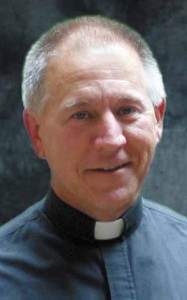By Fr. Bud Grant

In order to better understand what is going on, acoustic ecologist Gordon Hempton records sounds emanating from ecosystems. This seemingly esoteric science fringe is compellingly defended. Evolution, he notes, equipped us with eyelids with which to cut out sights, but not ear flaps, because that would have been too dangerous. Seeing, he asserts, is less essential to survival than hearing. Sounds reveal whole ranges of ecological interconnectedness which link us together like children whistling in the dark. Hempton’s personal epiphony (which means “exterior sound”) came when, while trying to sleep during a thunderstorm, it struck him that he’d always been taught that listening meant blocking out — in advance — all that was not what one was concentrating on hearing. Instead, he discovered, real listening is quietly letting everything speak symphonically.
This insight (or inaudio?) is personally poignant. Recently a walking companion asked if I could hear the birds chirping all around us — she was aware that I have tintinitis. For the first time since this thing afflicted me I felt an exquisite sense of loss. All I could say was: “if they are singing right now, then … no.” What sounds may we all have become deaf to, taken for granted, or tuned out? Silence means muting anthropogenic sound pollution in order to attend to nature’s harmonies, or what Dante called the riso del universo (the laughter of the cosmos).
Sadly, some natural sounds are just gone, or going. Once, driving through the Australian Outback late at night listening to the only station on the radio, I listened as people phoned from around the planet with a chillingly common refrain: “we don’t hear the frogs anymore.” In fact, frog species are mysteriously disappearing. So are bees, whose buzzing used to be one of the sounds of summer and whose silence heralds a colossal threat to the world’s food supplies. Such “sounds of silence” as these are mute warnings to which we should listen carefully.
Some noises also issue warnings that we should heed: the cracking and popping of the shattering glaciers and polar ice sheets, the wailing of record-breaking severe storms. In our artificially noise-stuffed environment it is perhaps understandable that we block some things out. But, as is our nature, we tend to select the uncomfortable noises for extinction first. Last month we were barraged with a cacophony of alarmist news-waves: Supreme Court decisions on gay marriage and immigration, floundering Egyptian democracy, and the government listening in on our phone conversations. Thus went unheard the most important policy statement of Mr. Obama’s presidency, in which he pledged to cut carbon emissions, prepare infrastructure for climate change, and to take the lead internationally on both of these initiatives.
Did you hear that? The president of the United States just said that climate change is so far progressed that, while we can mitigate, we must also adapt to it as an inevitable consequence of past inaction. “While no single step can reverse the effects of climate change,” he said, “we have a moral obligation to future generations to leave them a planet that is not polluted and damaged. Through steady, responsible action to cut carbon pollution, we can protect our children’s health and begin to slow the effects of climate change so that we leave behind a cleaner, more stable environment.”
As hearers of the Word we are constantly warned against ideologically induced deafness that blocks out the Gospel. Yet Jesus makes the dumb to hear. Summer is a good time to listen to nature; shoot, farmers insist that they can hear the corn grow! So how about we listen in? Check out Hempton’s audio recordings from www.onbeing.org. Better yet, silently slip outside this evening. I bet you are rendered speechless by the laughter of God’s creation. How sad if it were to go quiet and we belatedly realized that we’ve been left alone in the cosmos.
(Father Bud Grant is an assistant professor of theology at St. Ambrose University in Davenport.)







